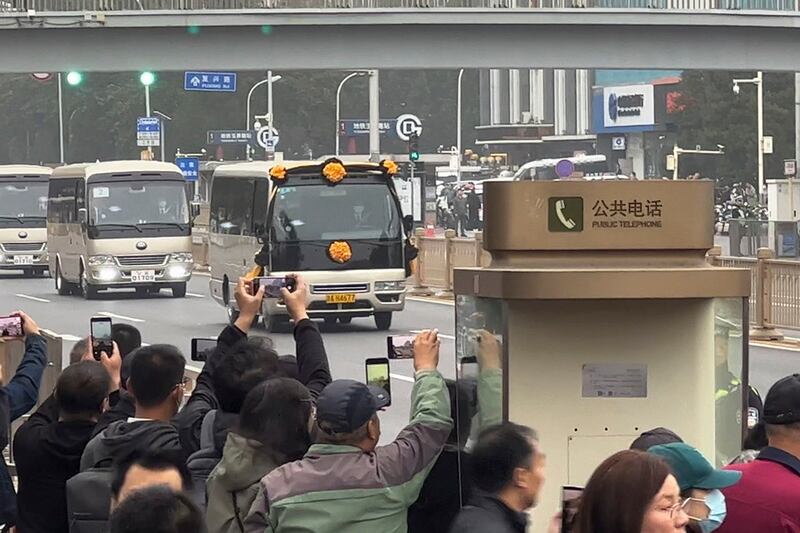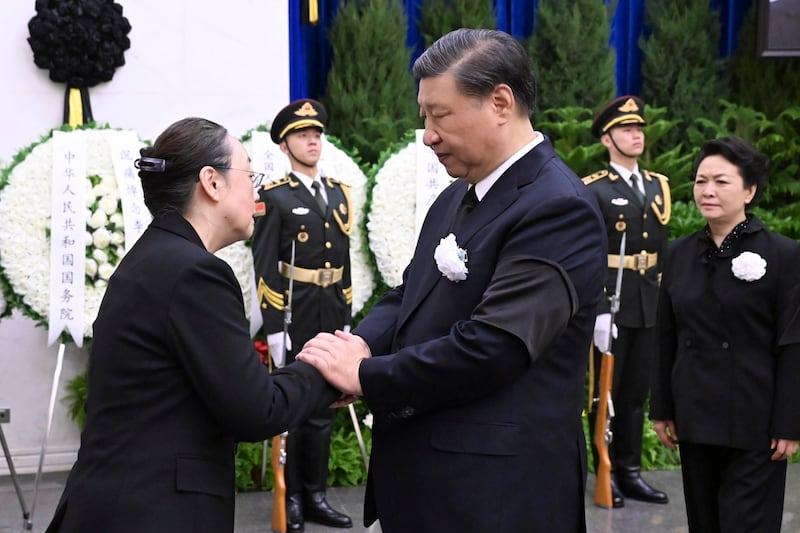Updated Nov 02, 2023, 05:05 a.m. ET.
Flags flew at half-mast in China on Thursday amid the funeral for former premier Li Keqiang in a low-key ceremony strictly contained to prevent any outpouring of grief that might trigger protests over President Xi Jinping’s management of the economy.
Li died unexpectedly of a heart attack on Friday morning at the age of 68.
He was cremated at the Babaoshan Revolutionary Cemetery in Beijing.
Xi, his wife Peng Liyuan and others bowed three times in front of Li’s remains to pay their respects, state news agency Xinhua reported. Former president Hu Jintao sent a wreath to express his condolences.
George Magnus, research associate at the China Centre, Oxford University and the School of African and Oriental Studies in London, said that Li had the potential to be a lightning rod for public frustration because “many Chinese … [regarded] him in death as a symbol of a past of which they were deprived.
“Even though Beijing will manage Li’s funeral to ensure that it passes swiftly and without public significance, there might be many Chinese …[who regard him as] a signpost to a different future,” said Magnus.
“No one can know how he would have managed the last decade differently from Xi, but his reputation and credibility in death may resonate nevertheless for people at a time of growing economic and social stress.”
Li may not have been a notable “reformer” premier – the second in charge of China after Xi and a protégé of former leader Hu Jintao – but he was a Peking University PhD and had a more “global” outlook.
He was focused more on China’s economy and foreign affairs than Marxist politics, of the kind Xi is enamored of.
Contender
Li was once considered a rival to Xi as top party leader in China, but he missed out on the job in a moment that may well have changed history.
State broadcaster CCTV reported that Li was "an excellent CPC [Communist Party of China] member, a time-tested and loyal communist soldier and an outstanding proletarian revolutionist, statesman and leader of the Party and the state."

The funeral protocol followed that established by former premier Li Peng’s death in 2019 – attendance by all top leaders, including Xi before the cremation but no public memorial service in the Chinese capital.
"Xi Jinping, Li Qiang, Zhao Leji, Wang Huning, Cai Qi, Ding Xuexiang, Li Xi, Han Zheng and Hu Jintao, among others, had either visited Li Keqiang when he was in hospital or expressed deep condolences and offered sincere sympathies to his family through various means after his passing," Xinhua reported. Xi along with Li, Zhao, Wang, Cai, Ding and Li Xi make up the Politburo Standing Committee, the party's center of power.
The lack of a public memorial is thought to be due to the fear that public memorials for state premiers can transition into protests against the established leadership, as was the case when Hu Yaobang passed away, eventually leading to the Tiananmen protests of 1989.
Memorials are reserved for country heads. The last one, which was televised countrywide, was for Jiang Zemin in December last year.
Sympathy from the Chinese people for Li was likely “due to the widespread belief that Li, who came from a humble background unlike princeling Xi, cared about the many less well-off people of China,” said Dexter Roberts, director of China affairs at the Mansfield Center at the University of Montana and a senior fellow at the Atlantic Council.
"That sentiment became particularly strong after Li, speaking in a nationally-broadcast press conference over three years ago, commented that China had 600 million people who survived on only 1,000 yuan (US$140) a month, "not even enough to rent a room in a medium Chinese city."
The other issue, wrote Roberts, who is author of the widely read Substack, Trade Wars, was Li's apparent commitment to the economy, in opposition to Xi's 'ideology over everything else' approach.
Tributes to Li “appear to be a way to indirectly express anger at Xi’s highly politicized rule and his policies, which many view as signaling an end to decades of Deng Xiaoping’s Reform and Opening, later in large part carried on by presidents Jiang Zemin and Hu Jintao, and premiers Zhu Rongji and Wen Jiabao,” noted Roberts.

Analysts are sure that Li and Xi had opposing agendas – different views on how China should stride onto the global stage, and it’s highly likely that Xi will not deeply regret the passing of the former premier who might have taken his job if Hu Jintao, the former leader of China had his way.
“Xi must show respect and affection for Li, which means he must pretend,” Perry Link, noted Chinese scholar, told Radio Free Asia. “And he has to do it with a grief-stricken look on his face, which means he must pretend not to be pretending.”
“Tough,” added Link.
Amid a glut of disappearances of top leaders and apparent upper-echelon confusion in Beijing the question might be just how much tough stuff can Xi handle.
“I don’t know what the tipping point might one day be for Xi,” said Oxford’s Magnus. “Maybe we are in it or close, maybe it’s still years away.
“But time I’d say is not on his side,” Magnus added.
Edited by Mike Firn and Taejun Kang.
Updated to include detail from the Babaoshan Revolutionary Cemetery.
